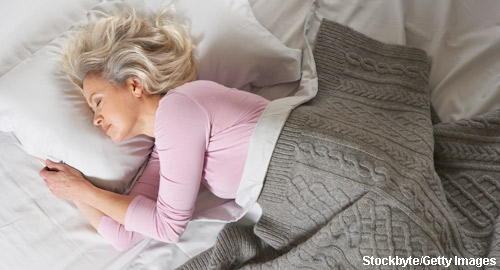 More than half of people with rheumatoid arthritis (RA) report clinically significant sleep problems.1 Despite this fact, your patients may not realize that a lack of good sleep may be exacerbating their fatigue, depression and pain, suggests Michael R. Irwin, MD, Cousins Distinguished professor of Psychiatry and Biobehavioral Sciences and director of the Cousins Center for Psychoneuroimmunology, Semel Institute of Science at the David Geffen School of Medicine at UCLA in Los Angeles, Calif.
More than half of people with rheumatoid arthritis (RA) report clinically significant sleep problems.1 Despite this fact, your patients may not realize that a lack of good sleep may be exacerbating their fatigue, depression and pain, suggests Michael R. Irwin, MD, Cousins Distinguished professor of Psychiatry and Biobehavioral Sciences and director of the Cousins Center for Psychoneuroimmunology, Semel Institute of Science at the David Geffen School of Medicine at UCLA in Los Angeles, Calif.
“We know that sleep problems affect pain,” Dr. Irwin says. “Initially it was thought that inflammatory pain impaired sleep, but research has uncovered reciprocal effects between sleep and pain. Sleep problems can lead to increased perceptions of pain, and RA patients who experience sleep problems show an exaggerated increase of pain perception or hyperalgesis.”2
Over the past decade, Dr. Irwin and colleagues have uncovered compelling evidence about how sleep disturbance affects neuroimmune function by initiating inflammatory response, which may also affect pain and RA disease progression. Here’s how: Sleep disturbance can trigger an increase in circulating markers of inflammation, such as C-reactive protein (CPR) and interleukin-6 (IL-6), the very same proteins that can trigger inflammatory response in RA patients. In fact, the medications RA patients are given to treat their rheumatologic conditions block these proteins and have also been found to improve complaints of insomnia.
Starting the Conversation
Dr. Irwin believes the key message rheumatologists should share with their patients is that disturbed sleep is not necessarily a consequence of a rheumatologic condition. But rather, sleep disturbance can be a predictor, and even a driver, of worsening inflammatory pain.
One of the primary measures of successful sleep is waking up feeling restored. If a patient says they are waking in the morning not feeling restored, Dr. Irwin recommends asking three questions to help determine the pattern of sleep disturbance:
- Do you have difficulty getting to sleep?
- Do you wake up at night and have difficulty getting back to sleep?
- Do you wake in the morning and not feel rested?
Supporting Healthy Sleep
In talking about sleep with patients, Dr. Irwin says rheumatologists can begin by explaining good habits—what he calls “sleep hygiene.”
“You would be surprised how poor many people’s sleep habits are. Yet they don’t realize the negative effect these poor sleep habits may have on their health, and this [issue] can be even more of a concern for RA patients,” Dr. Irwin stresses.
Here are six tips for successful sleep:
- Establish a regular sleep schedule, going to sleep and waking at the same times;
- Don’t drink alcohol in the evening;
- Don’t drink caffeinated beverages in the afternoon or evening;
- Make time to exercise during the day, if you can tolerate it;
- To help regulate your circadian rhythm, make time for natural light exposure throughout the day, particularly in the morning and evening; and
- Reserve your bedroom for sleeping and intimate sexual activity only. Don’t allow television/screens, food or work in your bedroom to ensure your bed remains a place dedicated to rest.
“Sleeping is a learned behavior,” Dr. Irwin emphasizes. “Your bed must remain dedicated to restful activity to support healthy sleeping habits.”
Evidence-Based Interventions
For patients who follow good sleep hygiene and still experience sleep disturbance, evidence suggests several strategies for relief, according to Dr. Irwin.
The gold standard for addressing sleep disturbance is cognitive behavioral therapy intervention (CBT-I), as recommended by the American Academy of Sleep Medicine. This approach has the strongest evidence supporting success, he says. However, a rheumatologist would need to refer their patient to a psychologist for this therapy.
Emerging evidence shows that community-based treatments that use mindfulness may also be effective. Example: Dr. Irwin and his colleagues found a movement meditation, tai chi, can be equally effective as CBT-I. However, tai chi is a series of low-impact meditative movements and may not be the best approach for RA patients experiencing joint inflammation, Dr. Irwin notes.
A separate published study co-authored by Dr. Irwin shows that mindfulness meditation is promising for reducing sleep disturbance. He suggests more research for alternative sleep support is needed, particularly for RA patients who are more susceptible to inflammatory response from their disease.3
One approach Dr. Irwin does not recommend is pharmacological sleep aids, especially in older adults. “Sleep aids are contraindicated in older adults and in older patients with rheumatologic conditions because these pharmaceuticals can impair function during the day and increase the risk for falls if patients get up in the night.” He is also concerned that these pharmaceuticals may wane in efficacy and mask underlying issues with sleep behaviors.
Carina Stanton is a freelance science journalist based in Denver.
References
- Irwin MR, Olmstead R, Carrillo C, et al. Sleep loss exacerbates fatigue, depression, and pain in rheumatoid arthritis. Sleep. 2012 Apr 1;35(4):537–543. doi: 10.5665/sleep.1742.
- Irwin MR, Olmstead R, Carroll JE. Sleep disturbance, sleep duration and inflammation: A systematic review and meta-analysis of cohort studies and experimental sleep deprivation. Biol Psychiatry. 2016 Jul 1;80(1):40–52. doi: 10.1016/j.biopsych.2015.05.014. Epub 2015 Jun 1.
- Black DS, O’Reilly GA, Olmstead R, et al. Mindfulness meditation and improvement in sleep quality and daytime impairment among older adults with sleep disturbances: a randomized clinical trial. JAMA Intern Med. 2015 Apr;175(4):494-501. doi: 10.1001/jamainternmed.2014.8081.
Additional Resources
Learn more about the evidence linking RA and sleep disturbance with pain and depression.
Read this study investigating tai chi vs. CBT to address late life insomnia and inflammatory risk.

